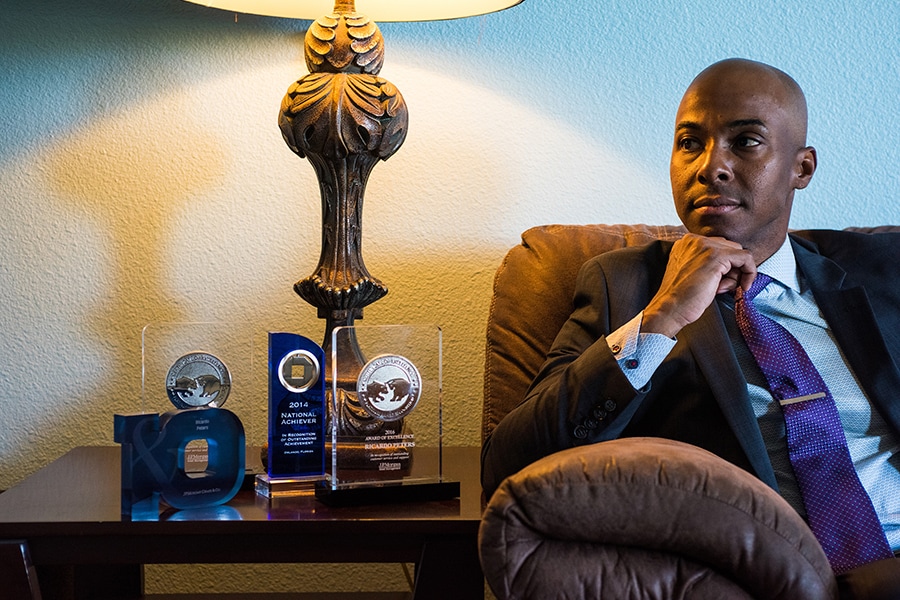
This is what racism sounds like in the banking industry
It is no secret that racism has been baked into the American banking system. Banks, including JP Morgan, say they are committed to eradicating this legacy, for both employee bias and racial profiling of customers, but what recently transpired in the Phoenix area suggests this is not true
 Jimmy Kennedy, a retired defensive tackle who played for five NFL teams, at his home in Glendale, Ariz., Oct. 21, 2019. Kennedy, who secretly recorded a conversation he had with a JPMorgan Chase financial adviser, filed a grievance with an industry watchdog over his experience at the bank and shared the recording with The New York Times. (Ash Ponders/The New York Times)
Jimmy Kennedy, a retired defensive tackle who played for five NFL teams, at his home in Glendale, Ariz., Oct. 21, 2019. Kennedy, who secretly recorded a conversation he had with a JPMorgan Chase financial adviser, filed a grievance with an industry watchdog over his experience at the bank and shared the recording with The New York Times. (Ash Ponders/The New York Times)Jimmy Kennedy earned $13 million during his nine-year career as a player in the National Football League. He was the kind of person most banks would be happy to have as a client.
But when Kennedy tried to become a “private client” at JPMorgan Chase, an elite designation that would earn him travel discounts, exclusive event invitations and better deals on loans, he kept getting the runaround.
At first, he did not understand why. Then, last fall, he showed up at his local JPMorgan branch in Arizona, and an employee offered an explanation.
“You’re bigger than the average person, period. And you’re also an African American,” the employee, Charles Belton, who is black, told Kennedy. “We’re in Arizona. I don’t have to tell you about what the demographics are in Arizona. They don’t see people like you a lot.” Kennedy recorded the conversation and shared it with The New York Times.
It is no secret that racism has been baked into the American banking system. There are few black executives in the upper echelons of most financial institutions. Leading banks have recently paid restitution to black employees for isolating them from white peers, placing them in the poorest branches and cutting them off from career opportunities. Black customers are sometimes profiled, viewed with suspicion just for entering a bank and questioned over the most basic transactions.
This year, researchers for the National Bureau of Economic Research found that black mortgage borrowers were charged higher interest rates than white borrowers and were denied mortgages that would have been approved for white applicants.
Banks, including JPMorgan, say they are committed to eradicating the legacy of racism. And they insist that any lingering side effects simply reflect stubborn socioeconomic imbalances in society as a whole, not racial bias among their employees.
What recently transpired inside a cluster of JPMorgan branches in the Phoenix area suggests that is not true.
Kennedy was told he was essentially too black. His financial adviser, Ricardo Peters, complained that he, too, was a victim of racial discrimination. What makes their cases extraordinary is not that the two men say they faced discrimination. It is that they recorded their interactions with bank employees, preserving a record of what white executives otherwise might have dismissed as figments of the aggrieved parties’ imaginations.
Patricia Wexler, a JPMorgan spokeswoman, defended the bank’s overall treatment of Peters and Kennedy. She said that the bank had not been aware of all of the audio recordings and that “in light of some new information brought to us by The New York Times,” the company put one of its executive directors on administrative leave while the bank investigates his conduct.
The back of the branch
Peters started his career at JPMorgan as a salesman in the bank’s credit cards division. After about eight years in various roles, he was promoted to a financial adviser position in Phoenix in 2016. His job was to help bank customers prudently invest their money.
Peters had won numerous performance awards at the bank, but things soon started going wrong for him.
He was working in a JPMorgan branch in the affluent Sun City West area of Phoenix. He sought a promotion to become a private client adviser, a job that would have let him work with wealthier and more lucrative clients.
The promotion never came. Instead, Peters was moved out of an office at the heart of the branch where he worked with other financial advisers and was relegated to a windowless room in the back.
In April 2017, one of his bosses, Frank Venniro, told Peters that another manager had accused him of taking customers’ files home at night, a violation of the bank’s code of conduct. Peters denied it, and Venniro accepted that he was telling the truth, according to a recording of the conversation. But, he added, Peters needed to be more cognizant of how his colleagues perceived him.
 Ricardo Peters, a former JPMorgan Chase financial adviser who has since started his own investment advisory firm, at his home in Phoenix, Ariz., Aug. 26, 2019. Peters has filed a discrimination claim with the federal Equal Employment Opportunity Commission and the civil rights division of the Arizona attorney general’s office, accusing JPMorgan of racial discrimination. (Ash Ponders/The New York Times)
Ricardo Peters, a former JPMorgan Chase financial adviser who has since started his own investment advisory firm, at his home in Phoenix, Ariz., Aug. 26, 2019. Peters has filed a discrimination claim with the federal Equal Employment Opportunity Commission and the civil rights division of the Arizona attorney general’s office, accusing JPMorgan of racial discrimination. (Ash Ponders/The New York Times)Peters was left with the impression that his managers, who were white, were predisposed to view him suspiciously. Could he prove it? No.
What happened next was clearer.
Peters complained to Venniro that another financial adviser was trying to steal a prospective client: a woman who had just received a $372,000 wrongful death settlement after her son died. She was black.
Venniro told Peters that there was no point in his intervening in the dispute, because the woman was not a worthwhile client. “You’ve got somebody who’s coming from Section 8, never had a nickel to spend, and now she’s got $400,000,” Venniro said, referring to the federal program that provides vouchers to help with housing costs and whose title is sometimes used as a racial slur. “What do you think’s going to happen with that money? It’s gone.”
“But I thought that’s why we get involved,” Peters protested.
Venniro said no. “You’re not investing a dime for this lady,” he said. He knew from experience that she would quickly burn through the money. “It happens every single time.”
When Peters tried to argue, Venniro interjected. “This is not money she respects,” he said. “She didn’t earn it.”
Venniro declined to comment.
Wexler, the bank spokeswoman, said that Venniro was put on leave after inquiries from The Times and that he resigned Dec. 5.
“Our employee used extraordinarily bad judgment and was wrong to suggest we couldn’t help a customer,” she said. She said Venniro knew the client was in subsidized housing but did not know her race.
Marching orders
In February 2018, Peters was transferred from the Sun City West branch to a JPMorgan branch in a less wealthy neighborhood. He perceived it as another example of managers, including Venniro, mistreating him because he was black.
 Performance awards from Ricardo Peters' time as a financial adviser for JPMorgan Chase are displayed at his home in Phoenix, Ariz., Aug. 26, 2019. Peters has filed a discrimination claim with the federal Equal Employment Opportunity Commission and the civil rights division of the Arizona attorney general’s office, accusing JPMorgan of racial discrimination. (Ash Ponders/The New York Times)
Performance awards from Ricardo Peters' time as a financial adviser for JPMorgan Chase are displayed at his home in Phoenix, Ariz., Aug. 26, 2019. Peters has filed a discrimination claim with the federal Equal Employment Opportunity Commission and the civil rights division of the Arizona attorney general’s office, accusing JPMorgan of racial discrimination. (Ash Ponders/The New York Times)One day, Peters met Kennedy, then 38. Kennedy had played for five NFL teams as a defensive tackle. In 2011, he had joined the New York Giants — a homecoming that, The Times wrote at the time, was notable because of his impoverished childhood in Yonkers, New York. That season, Kennedy and the Giants won the Super Bowl.
Kennedy retired and later moved to Phoenix. JPMorgan bankers had been courting his business, but he had not liked the financial advisers the bank had proposed to manage his investments. Then he met Peters.
“The chemistry was just so real because he knew exactly what I needed to do,” Kennedy said.
In the summer of 2018, Kennedy gradually moved $800,000 to the bank. Peters and a colleague promised he would get “private client” status, which was reserved for accounts with more than $250,000.
Landing a wealthy client like Kennedy was a big win for Peters, but he was anxious about being targeted by his superiors. On Aug. 24, he filed a formal complaint with the bank. He said he had alerted Venniro “that I feel that I am being treated differently because of my race and color of my skin” and that Venniro had suggested that the solution was for him to work in the less-wealthy branch.
Less than two weeks later, JPMorgan agreed to pay $24 million to end a class-action lawsuit brought by other black employees who said the company had discriminated against them — in some cases by isolating them from colleagues and dumping them in poorer branches.
On Oct. 5, Venniro took Peters to a meeting room and said he was being fired. Venniro said he didn’t know why.
“I’m just given marching orders,” Venniro told him, according to a recording of the conversation.
Peters filed a discrimination claim with the federal Equal Employment Opportunity Commission and the civil rights division of the Arizona attorney general’s office, accusing JPMorgan of racial discrimination. JPMorgan denied that and said Peters was fired for improperly assigning credit for a new client to an employee who managers did not think deserved it.
“We stand by our decision to terminate Peters,” said Wexler, the spokeswoman. “The facts are indisputable.”
Peters disputed the facts. He said that he had given credit to the correct employee. He said the bank was using a mundane internal dispute as an excuse to fire him. He has since started his own investment advisory firm in Arizona.
‘If this dude gets upset’
Peters’ termination left Kennedy in the lurch. A number of his transactions were frozen or not carried out. In one case, $92,000 of Kennedy’s money that was supposed to go into a new investment product ended up in a holding account, inaccessible to Kennedy. (Wexler said the problems were caused by administrative errors.)
JPMorgan assigned him a new financial adviser, Belton. He struck Kennedy as inexperienced. He was black and Kennedy felt that was the only reason they had been paired. Kennedy said he began recording their conversations so he could get feedback from other people about Belton’s financial recommendations.
Kennedy had been under the impression that he had been granted the coveted “private client” status that Peters had promised. When Kennedy learned that was not the case, he complained to Belton — and then to Venniro.
Belton warned Kennedy not to talk to Venniro again. In two secretly recorded conversations in October last year, he asked Kennedy to think about the impression he left on people at the bank. He pointed out that Kennedy was a big black man in Arizona. And he said that Venniro had been afraid to tell Kennedy that his application to become a private client had been deleted when Peters was fired.
A few days later, Kennedy went back to the branch and the conversation returned to the question of why the bank refused to grant Kennedy the status and perks of being a private client.
Belton said that bank employees were scared of dealing with him and that therefore Kennedy would be better off interacting only with Belton.
“They’re not going to say this, but I don’t have the same level of intimidation that they have — you know what I’m saying? — not only being a former athlete but also being two black men,” Belton said. Referring to Venniro, he added, “You sit in front of him, you’re like three times his size — you feel what I’m saying? — he already probably has his perception of how these interactions could go.”
Moments later, he said: “We’ve seen people that are not of your stature get irate, and it’s like, ‘Well, if this dude gets upset, like what’s going to happen to me?’”
Kennedy asked if Belton was saying that Venniro was racist.
“I don’t think any person at that level is dumb enough for it to be that blatant,” Belton replied. “I don’t have any reason to believe blatantly that he’s that way. You feel what I’m saying? Now, whether there’s some covert action? To be honest? I always err on the side of thinking that. You know, people that are not us probably have some form of prejudice toward us.”
Kennedy pulled most of his money out of JPMorgan and filed a grievance with an industry watchdog and in June the bank sent him a letter trying to put an end to his complaining.
“You stated that Mr. Belton informed you that our firm was prejudiced against you and intimidated by you because of your race,” the letter said. “We found no evidence to substantiate your allegations.”
©2019 New York Times News Service




